“Peak Performance”
Written by David Kemper
Directed by Robert Scheerer
Season 2, Episode 21
Production episode 40272-147
Original air date: July 10, 1989
Stardate: 42923.4
Captain’s Log: The Enterprise welcomes Sirna Kolrami, a Zakdorn strategist who is supervising a war game between the Enterprise and an eighty-year-old derelict, the Hathaway, in the Braslota system. The Hathaway will need to be made space-ready—Riker will captain the ship, and he will have two days for his hand-picked forty-person crew to do that. Then the battle exercise will commence, with simulated phasers and torpedoes, and the computer shutting down any areas affected by the simulated strikes.
Picard and Riker both think the exercise is a waste of time, as combat strategy is a minor part of a starship captain’s job, but Picard feels that the Borg threat is enough of an issue to overcome his objections.
Riker can choose from anyone on board save for Data, who will serve as Picard’s first officer. He recruits La Forge, Worf, and Wes, then challenges Kolrami to Strategema, a game at which he is a past master. Kolrami beats him in about four seconds, to the chagrin of his audience, who would like to see the arrogant strategist taken down a peg.
They arrive at Braslota, and beam over to the Hathaway. It’s a wreck, and it’s got only a few dilithium crystal shards and no antimatter to power the drive. Riker mentions this to Kolrami, asking what the Zakdornian word for “mismatch” is. “Challenge,” is Kolrami’s answer, and how they perform in a mismatch is the point.
After being told by Riker to improvise, Wes beams his plasma physics homework over from the Enterprise, as it contains antimatter, which will allow them to power a two-second warp jump, which will make a nice surprise during the exercise.
While Riker gets the Hathaway ready, Data is manipulated by Pulaski into challenging Kolrami at Stratagema. Kolrami beats him, to everyone’s shock—especially Data’s. So stunned is he by his failure that he takes himself off active bridge duty, fearing that he is malfunctioning in some way. It is Picard who points out that it is possible to make no mistakes and still lose.
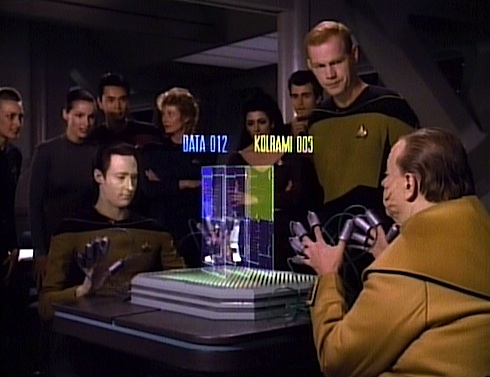
Kolrami expresses disdain for Riker’s command style—what he calls an inappropriate joviality—which Picard turns around and defends.
The war game commences. On Riker’s instruction, Worf hacks the Enterprise security system and makes them think they’re being attacked by a Romulan ship. While distracted, the Hathaway gets a mess of simulated hits.
However, when the Enterprise detects a Ferengi ship on approach, Picard assumes it’s another trick—right until the Ferengi fire on them. The Kreechta is commanded by Bractor, who wants to know why the Enterprise fired on a vessel of lesser design, and then protected it when the Ferengi attacked. Bractor offers to let the Enterprise go if they turn over the Hathaway, which they assume has some value, giving them ten minutes to decide.
Picard refuses to retreat and leave the Hathaway vulnerable. Riker insists that he do so, as the Hathaway will activate their warp drive—which gives away Riker’s ace in the hole, but which also prompts a notion in Picard. The Enterprise ‘s main weapons are offline thanks to the Ferengi, but they are able to fire two (and only two) photon torpedoes. Data theorizes that if the Enterprise fires the two torpedoes on the Hathaway, with the Hathaway activating their warp drive at the moment of detonation, it will appear to the Ferengi as if they have been destroyed.
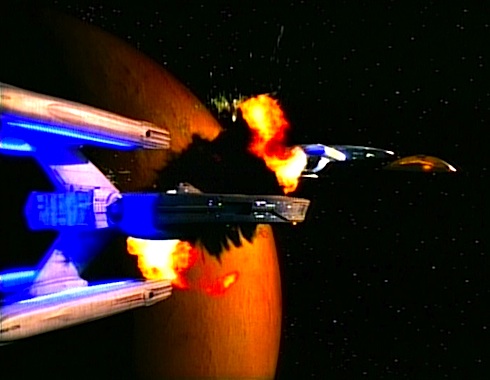
Sure enough, it works, with an exclamation point from Worf, as he uses the same holographic trickery on the Ferengi to make them think another Starfleet vessel is on approach. The Ferengi bugger off, and the Enterprise retrieves Riker and his crew.
Data decides to accept Kolrami’s offer of a rematch. He plays a game that lasts longer than any Stratagema game in history before Kolrami gets fed up and quits the game. Data changed his strategy so he constantly played for a draw rather than victory—which Kolrami’s ego couldn’t stand before he quit.
Can’t We Just Reverse the Polarity?: “Have you ever driven a Grenthamen water-hopper?” “Yes.” “Ever pop the clutch?” That is so much better than the usual technobabble we get. It explains exactly what the problem is, succinctly, humorously, and with a minimum of impenetrable jargon.
Thank You, Counselor Obvious: Troi is unable to get Data to come out of his quarters, but she does keep him from overanalyzing Riker’s likely strategy.
There is No Honor in Being Pummeled: Worf also thinks the exercise is a waste of time—”If there is nothing to lose, no sacrifice, then there is nothing to gain”—and when asked by Riker what you’ve got if you’re outmanned, outgunned, and out-equipped, he replies: “Guile.” That answer’s enough to get Riker to make him first officer, and sure enough, it’s Klingon guile that saves the day.
If I Only Had a Brain : Data loses at Stratagema to Kolrami, only to view it as a catastrophic malfunction. Troi, Pulaski, and Picard visit him in succession, trying to get him to come out of his quarters. Troi tries psychobabble, Pulaski tries being snotty (“How long are you going to sit sulking like Achilles in his tent?”), with Picard finally succeeding by, well, being the captain.
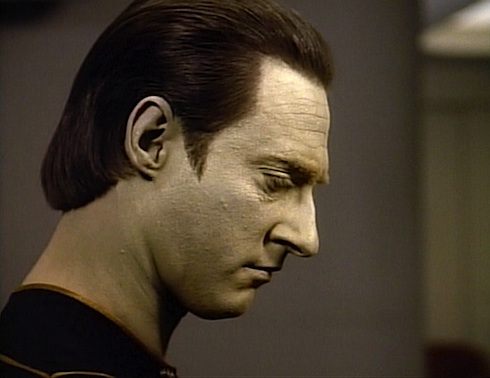
This is Data’s second shot at being first officer, and he once again does a better job than the guy who normally has the job.
The Boy!?: Wes beams his plasma physics homework—an experiment with antimatter—off the Enterprise to the Hathaway, which enables them to activate their warp drive. It’s especially fun for him to play Burke like a fiddle, boring him with technobabble and platitudes to cover his beaming it to the other ship.
I’m a Doctor, not an Escalator: Pulaski finds Kolrami to be arrogant and obnoxious, prompting her to arrogantly and obnoxiously manipulate Data into playing him at Stratagema.
Welcome Aboard. Roy Brocksmith has always been an excellent character actor, but I’d argue that this was his strongest performance, playing Kolrami as a distinctive, hilarious character. Armin Shimerman returns as the second of three Ferengi he would play—the last one being one of the first Ferengi we ever saw, and the next being Quark, an opening-credits regular on Deep Space Nine—and he imbues Bractor with far more menace than any Ferengi we’ve seen to date. David L. Lander and Leslie Neale fill in nicely as a Ferengi and Ensign Nagle, respectively.
But this episode’s Robert Knepper moment is Glenn Morshower as Ensign Burke (who temporarily is promoted to lieutenant by a flubbed bit of Picard’s dialogue). Morshower’s probably best known for his recurring role as über-reliable Secret Service Agent Aaron Pierce on 24.
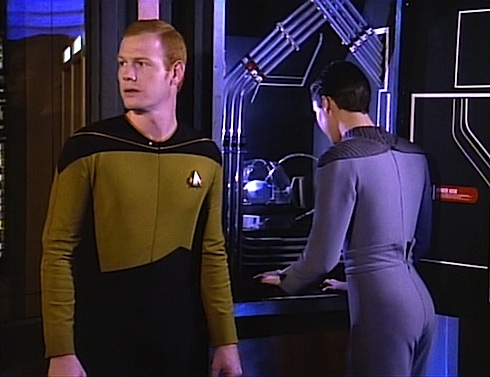
I Believe I Said That: “I have wagered heavily in the ship’s pool that you will take him past the sixth plateau.”
“And if I don’t?”
“I will be irritated.”
Riker and Worf, discussing his Stratagema game.
Trivial Matters: For the second week in a row, we have an episode with a future Farscape scribe in the writing credits—last week it was Richard Manning, this week, it’s Farscape‘s co-executive producer Kemper. Both Kemper and Farscape creator Rockne S. O’Bannon are big Star Trek fans, and plenty of Trek references snuck into their show.
Riker points out that “Captain Riker’s never lost,” referring to the events of “A Matter of Honor.”
This is the first reference to the Borg since “Q Who,” though this episode makes it clear that Starfleet is preparing for their threat, as we’ll see again in “The Best of Both Worlds” at the end of the third season.
When Riker addresses the entire ship, the bosun’s whistle is the one from the original series.
In your humble rewatcher’s eBook novella Many Splendors, reprinted in the Star Trek: Corps of Engineers: What’s Past trade paperback, one chapter retold this episode from the POV of La Forge’s engineers, including actually dramatizing the one-second warp jump, which Riker described in the episode as “different.”
Make it So: “I busted him up.” There is a great deal to like about this episode. The dialogue is spectacular, the plot moves along beautifully, there’s humor, action, and some truly great guest performances. The hallmark second-season expansion of the cast to show more of the crew continues with Burke and Nagle from security, and the entire cast gets at least one moment in the sun.
In particular, there’s a relaxed camraderie among the Enterprise crew on both ships that is very appealing, from Worf’s wager to Wes’s “improvising” to Picard’s upbraiding of Data to Riker’s glee at his assignment to La Forge’s playing with engineering toys to Data’s busting Kolrami up.
However, the episode has some major logic problems in its climax. Picard asks if Riker was monitoring communications, and says that Kolrami is right, that the Enterprise should retreat—except Kolrami didn’t say that while communicating with the Ferengi or the Hathaway, so how did Riker know?
The Ferengi damage to the Enterprise is incredibly contrived—the control systems that allow them to switch from simulated to regular weapons are fused, and the transporter’s out. Basically they only lose what’s convenient to the plot, which is remarkably specific.
Much more problematic—if the Hathaway can monitor the communications between the Enterprise and the Kreechta, why can’t the Kreechta do likewise for the communications between the Enterprise and the Hathaway, thus overhearing their entire plan?
And finally, Worf’s little bit of guile worked because he knew the Enterprise security codes. So how did he pull the same trick on a Ferengi ship whose codes he doesn’t know, not being chief of security for that ship? (Of course, knowing the Ferengi, they probably got their security systems on the cheap anyhow…)
Still, these are minor speed bumps on a fun ride. This would’ve made a nice season finale, actually.
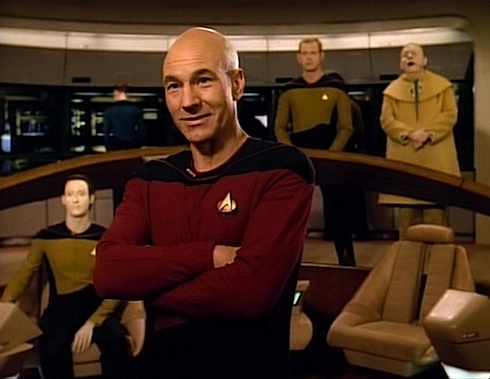
Warp factor rating: 7
Keith R.A. DeCandido is not at all looking forward to watching “Shades of Grey” later this week. His most recent novels are Guilt in Innocence, part of “Tales from the Scattered Earth,” a shared-world science fiction concept, and the fantastical police procedurals SCPD: The Case of the Claw and Unicorn Precinct. Find out more about Keith at his web site, which is a portal to (among many other things) his Facebook page, his Twitter feed, his blog, and his podcasts, Dead Kitchen Radio, The Chronic Rift, and the Parsec Award-winning HG World.










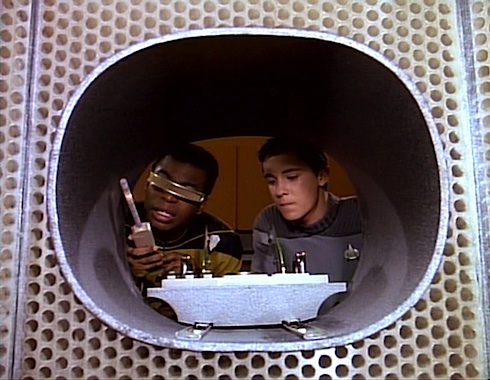
Is the last line of this review a tease for the actual season finale, that’s coming up next?
I’m pretty much 100% with you on this episode.
I don’t think this is what the writer intended, but to me, the Stratagema games are an allusion to present-day college sports (particularly football and basketball). Kolrami represents the big school with the great team (a Duke or Florida or Ohio St. etc.). Riker represents one of those schools’ overmatched early-season opponents (in it just for the opportunity, and a big payday, though the latter does not apply to Riker). Data represents the big-time opponent we all want to see that school play, but the oppoent that they also keep ducking. Finally, Pulaski represents the major TV executive that puts the dream matchup together.
Again, very far-fetched, but this actually did run through my mind in rewatching this show.
Good review, Keith.
I think that this episode shows an interesting turning point in the evolving world of Star Trek. The Original Series and first couple seasons of Next Gen try too hard to be big issue, thought provoking on a regular basis, to the point that it very frequently comes across as if the writers/Roddenberry are trying to do a very special episode. As a fan though, sometimes I just want to see the damn ship fight.
In this episode, we hear Riker/Picard say that combat is just a minor and unimportant part of a Captain’s job, because in Rodenberry’s mind Starfleet was a part of egoless utopian society (we seem to have eliminated everything that’s troublesome-hunger, greed, headaches.). We don’t see Starfleet engage in too much long-term conflict with anyone. After Season 2 though, we start to see a much less utopian society though where there are bigger/smaller problems with longer-lasting impacts. Not only are the characters not so damn perfect, but apparently there are some other people in the galaxy who don’t like the Federation so much and as a result, we fight the damn ship more often. We still get to have high ideals, but we also see that Picard, Riker, Sisko, Janeway and all of the others actually know how to fight.
I realize that some of the reason the ships didn’t fight that often was that CGI/modeling was expensive, versus more recent series such as Voyager or RDM’s Battlestar Galactica which doesn’t make it cost prohibitive to have combat scenes, but I think part of it was that Rodenberry was trying to hammer home his utopian society a little too hard
Because the international communications are broadcast in the clear, and the intra-Starfleet communications link uses standard encryption? C’mon, this is 20th century stuff, not treknobabble. ;)
A good episode, even if Worf’s sleight-of-hand with what is presumably a completely alien computer in the Ferengi vessel – that’s the Ferengi who we knew ‘almost nothing about’ just one and a half seasons ago – stretches credulity beyond breaking point. Also, this is one of those rare ‘Picard screws up’ episodes!
Nentuaby: Yeah, but the Hathaway[i] [/i]is a clapped-out 80-year-old ship. They can listen into the coded transmissions but the Ferengi can’t? I don’t buy it. And I don’t buy that the Ferengi can’t listen into a coded frequency. Also, no mention was made of securing communications, and they usually went to the trouble of doing so (viz. “The Battle,” among other places).
Mike S.: Interesting interpretation, though not one that would have occurred to this baseball fan. *chuckle* And yes, the finale is next.
—Keith R.A. DeCandido
I know you a baseball fan, KRAD, because I follow your blog often. I’m a Yankees fan too.
REALLY looking forward to your finale review, if you know what I mean.
Wow. TMI overload. I’m going to have to eject the core now. OTOH, that Data is a “better” First Officer than Riker isn’t really surprising. A First Officer’s primary job is to keep things running so the Captain can decide where he wants them to run to. His secondary job is to understudy the Captain, and prepare for his own command. Riker does pretty well at the understudy part, but fails miserably when it comes to movin on up. Of course, that crew members never rotate out is one of the less realistic points of the show…despite it’s utility to the ensemble.
I never understrood that “Jacques Costeau in Space” bit either- fighting your ship isn’t important when your neighbors include Klingons, Romulans, Gorn, even Orions. Gah.
And how similar is the little warp jump to the “Picard Maneuver”?
So Picard thinks it’s a waste of time, but overcomes his own objections? This paragraph didn’t “track” for me, so I wanted to make sure I was reading it right, and it’s not a typo.
Data as 2nd officer is win-win for Picard. He contributes everything he’d contribute as 1st officer without feeling exploited, and Riker continues serving happily rather than sulking around in envy of 1st officer Data.
@@@@@#8: “I never understrood that “Jacques Costeau in Space” bit either- fighting your ship isn’t important when your neighbors include Klingons, Romulans, Gorn, even Orions. Gah.”
At the time, the Klingons were allies. The Gorn hadn’t been an enemy since “Arena” (and as we later learned, they ceded Cestus III even though it was rightfully theirs). The Romulans had barely been heard from. And there hadn’t yet been any TNG references to the Orions, who’d never been more than a piratical nuisance. The Federation of early TNG was depicted as a society accustomed to living at peace.
Of course, then “The Wounded” came along a couple of years later and blew a big hole in the continuity by claiming the Federation had actually been at war with Cardassia during TNG’s first couple of seasons…
As I recall, Worf didn’t use his hacking trickery on the Ferengi. Their sensors detected another Federation ship approaching because there WAS another Federation ship approaching: the Hathaway. The Ferengi didn’t realize they’d been had because they thought that the Hathaway had been destroyed and they couldn’t tell that the approaching ship was the same beat-up clunker they were trying to claim.
So, it was a similar bit of guile, but executed differently, in a matter not requiring plotholes.
Tice: You recall incorrectly. Riker specifically said that, after the warp jump, Worf was to “prepare another surprise for them.” It wasn’t the Hathaway the Ferengi detected.
Kolrami is such a delightfully annoying character! It was a very enjoyable rewatch, and I agree, a pretty good episode. The only flaw is indeed that Worf trick on the Ferengui…sorry, but could not suspend disbelief there, good thing it was near the end of the episode and we move quickly to Data’s stratagema rematch.
As for the season finale, can’t we re-rewatch another second season episode? :D We could have a poll to decide which one…or ummm…rewatch one of those 25th anniversary specials…Frakes hosted some of them didn’t he? Just a thought…but if you insist… *shudders* :P
Don’t think of the upcoming “Shades of Gray” as a failure – think of it as Pulaski’s last episode.
See now, isn’t that pleasant? She could set the bridge on fire while reciting her 20 hour epic poem regarding Data’s inhumanity and you’d think, “Oh, she’s such a card. I hope she has a nice trip.”
I always thought that Pulaski’s role, and Diana Muldaur’s job, was a thankless one. I’ve had that sort of stinky job before, the one where the perameters are impossible, so you know your performance review will stink.
And how similar is the little warp jump to the “Picard Maneuver”?
I noticed that too, and wondered if Riker’s original plan was to get in a situation where he could use the Picard Maneuver on Picard, for the lulz.
Whenever I see Glenn Morshower in anything, my first thought is, “Hey, it’s the guy who filled in for Worf during ‘Peak Performance.'”
I’m surprised “Very unfortunate. We will be dead” didn’t make it into the review – it was always one of my favorite lines of this era of the show.
Really liked this episode. It’s not amazing, but it’s fun to watch. A lot of the second season episodes aren’t very good, but in this episode you get to see how much the cast has developed since the first year.
I have to disagree with you about the Ferengi seeming menacing. Frankly, this was the last nail in their coffin as anything but a comic villain. Can you imagine the Romulans being chased away by Worf’s “guile”?
I really liked the mention of the Borg here, as well as the crew’s horror when they get a sensor ghost of a Borg ship in “Evolution.” I feel like little moments like this did a good job reminding us just how freaked out Starfleet was by the Borg so that it really feels like doomsday when they finally come back.
Okay, bring on the review of “Shades of Gray”! Will it be the first episode KRAD rates 0 out of 10??? I can’t wait to see!
“It is possible to commit no mistakes and still lose. That is not a
weakness. That is life.”
One of my favorite Picard quotes.
Surprised that no one commented on the “Stratagema” thing itself. It’s the “Anbo-Jyutsu” again: Meant to be an “advanced” game, but actually pretty stupid.
Any game that would be the most challenging game of strategy should of course have nothing to do with dexterity or sleight of hand. But that’s exactly what “Stratagema” seems to be, from what we can tell: It is a mixture between a strategy thing played on three boards at once AND the ability to move your fingers quickly.
It is, to put it in modern computer terms, a real-time strategy game, and thus inevitably connected to physical abilities. To be a real test of brain, it should be some kind of turn based strategy instead (like, the ultimate turn based strategy game … chess).
Keith:
I concur fully in your assessment of this episode. It’s a fun ride to go on. I like the sequences where Riker and company have to pull a “Scotty” on the Hathaway. (And they succeed swimmingly!) Data being shaken by losing to Kolarami is just emotional enough to stir in, and shows his evolution.
And Picard’s bug comes out of his ass. (Or is it a gerbil??)
Great assessment. And thank you for writing all of this.
“Have you ever driven a Grenthamen water-hopper?”
“Yes.”
“Ever pop the clutch?”
— What??? This is indecipherable technobabble to me.
“Sometimes it is possible to make no mistakes, and still lose”.
Picard’s message to Data after losing in Strato, carries much weight and is a very well-written bit of dialogue.
Love this episode, but a few things have always bothered me. If Starfleet really wanted to have proper war games, why not use capable ships and actual crews rather than a derelict ship and split up the Enterprise crew? I know there were budgetary restraints, but did the Hathaway have to be a Constellation class ship just like the Stargazer? The Stargazer would have been the newer ship, yet the Hathaway has the more modern looking interior and a completely different bridge than the Stargazer. The corridors outside of Engineering on the Hathaway are very obviously the Enterprise’s.
The purpose of the exercise, as Kolrami said, was to see how they perform in a mismatch. The Enterprise is to the Hathaway as the Borg is to the Enterprise, which is the point.
—Keith R.A. DeCandido
Stratagem was stupid why didn’t they just use 3d chess.
Have to disagree with #23 about Strategema; it’s nowhere near as bad as Anbo-Jutsu and I don’t think it’s bad at all. Firstly the episode (wisely) never explains how the game actually works and secondly as I saw the game as putting a premium on not only thinking well but thinking quickly I interpreted the finger controls as diminishing the physical aspect as flicking the fingers is such a trivial motion that it translates thought to moves in the game with a minimum of fuss. Real videos games work much the same way.
Riker could listen to Picard speaking with the Ferengi because the Enterprise opens up a Channel to the Hathaway. A bit like if you communicate with person A via telephone and simply turn on the speakers.
While speaking among themselves they encrypt their channel so the Ferengi can’t listen.
There’s really no plot hole here.
@23, @31. Way late to the party, but as a 9 year-old kid when this episode first aired, the Strategema subplot was by far my favorite part of this episode. Unlike other “silly” aspects of early TNG that I have long since outgrown, I still find the Strategema plot interesting. I too wonder what the rules are supposed to be… It appears to be somewhat similar to the old Atari/computer game Qix, to throw out a dated reference, where you work to box out an opponent by capturing large chunks of the board.
I was always fascinated by Tongo in DS9, and whether there was any inherent consistency in the rules of play they seemed to be following across numerous seasons, by calling out “confront,” “evade,” etc. (it turns out there wasn’t a whole lot of consistency). Someone on the Internet—God bless the Internet—created a set of rules for Tongo based as closely as possible on the episodes, and fabricated a game board that I think you could buy at one point. For obvious reasons, no one is going to fabricate a working Strategema set, but it would be cool if someone tried to figure out the “rules,” such as they are.
Stratema is way less stupid than Anbu-Jitsu, by the way, which just looks like a rejected American Gladiator event.
Lastly, in terms of games in Star Trek that appear to make no sense whatsoever, #1 has to be whatever stupid game the aliens make the DS9 crew okay in “Move Along Home.”
There is absolutely nothing remotely realistic, redemptive, or reasonable about the stupidity that is “Anbo-Jytsu.” Just a dumb concept and even dumber execution.
—Keith R.A. DeCandido
@33/krad: They should have used 3D karate.
Speaking of weird games, anyone remember “Kosho” from “The Prisoner”?
Comical moments that I’m guessing were part to what you mentioned as every crew member getting their moment – the random extra who acts like she just won a contest to be on TNG – she gets to speak in three scenes, and it’s super wooden acting in each one:
– Butting in on Worf and Riker talking about fooling the Enterprise sensors
– Whining about optic cables (Worf ripping cable out of the ceiling)
– Running down to Riker and Worf to declare the Enterprise is under attack by a real ship (because Worf didn’t know)
Runner up on funny moments:
– Kolrami slapping Burke on the shoulder at the end and giving him a flirty look after!?! hahahah
– Watching Data’s and Kolrami’s score counters during their final match go up and down – presumably due to editing the clip sequence after the special FX were added to the footage
Or scores can go up and down during the course of a match.
Never understood the point of the supposed “war game” exercise. Using a derelict, ancient star cruiser vs. the state-of-the-art. Was it to just test the crew’s psychological response? Because as a practical strategic and tactical exercise, it would be an utter failure. “Guile” isn’t going to help if you’re completely overmatched; you’re going to lose and be dead. When the Borg come, what is Worf going to do? Hack their computer network and implant the image of Species 8472 to scare them away? Oh, that’s right, wrong series. Until then, the Borg were unstoppable. A realistic war game would have gone like the “Odyssey” battle in “The Jem’Hadar:” Shields penetrated, warp drive gone, heavy casualties, followed by complete and utter destruction. No chance. THAT is life. And that would be the end of their’s. Utter uselessness.
#38
I think it’s about putting them in the mindset that the situation is hopeless and they’ve got to keep thinking and fighting anyway. Certainly what they did in The Best of Both Worlds, and it paid off.
I’m wondering if the Kobiyashi Maru test is still used in the 24th century. In this more peaceful time, when the Klingons are allies, are Starfleet officers not accustomed to the idea of a no-win scenario?
No mention yet of one of my favorite ever Riker moments–gathering his team for the Hathaway.
Geordi was easy, as revealed by that he was already packed. Was just waiting for the invitation.
Worf–that was the good one. He didn’t even think the exercise had any real value, and assumed the outcome would be obvious until Riker made him think about what he’d do if he were the underdog. Worf’s attitude changes from dismissive to delight at the challenge–giving meaning and motivation to a task that until then had none for him. And Riker guided him to that change so easily and elegantly. Top notch leadership.
This is one of the few second season episodes that I watch when going back through the show (along with Contagion for Taris and sometimes Q Who). I really like a lot about it.
The guest stars are amazing. Kolrami is obviously excellent, right down to his mannerisms and the perfect blending of the actor’s physical appearance and the makeup defining the new race. But Nagle and Burke are also good rounding out Enterprise personnel. Once again, I’m left wishing they would recur, but TNG is quite poor on bringing any non-bridge personnel back until much later in the run.
My main problem with the episode is that the bumbling, comical Ferengi are able to nearly destroy the Federation’s best ship (this happens again in Rascals). These Ferengi are obviously not played for comedy as much as in other TNG appearances, but it is hard to believe that the Enterprise succumbs so easily. It also calls into question why Starfleet would conduct this exercise in exposed space if turning off the ships’ weapons could be so crippling. Why expose crews to such danger? Hold the war game in Sol System or some other safe Federation territory.
Riker and Picard’s objection to the simulation is also very contrived, Roddenberry-esque nonsense. They are the ship that discovered how mismatched they are against the Borg (who are now on their way) yet they question the need for an exercise involving combat between mismatched opponents? That’s silly.
The Hathaway also being an old derelict that everyone looks down on doesn’t really fit with the fact that Starfleet is still using Miranda-class starships as front-line combat vessels (see: Dominion War years later) and that the Constellation-class USS Victory is still in active service (and, in fact, La Forge was serving on Victory not that long ago). This is a script and effects problem that plagued the show a lot. There seemed to be this assumption in lots of dialogue that Starfleet was mostly made up of super-advanced Galaxy-class era ships, when, in fact, the Starfleet of TNG is almost entirely made up of Mirandas and Excelsiors from TMP era, with a couple of Galaxy and Nebula class vessels sprinkled in.
@41/jeremys: “but TNG is quite poor on bringing any non-bridge personnel back until much later in the run.”
Well, Miles O’Brien (although not named) was introduced in the series premiere, showed up again in the first season, and by the second season was a regular reoccurring character. So between him and Guinan, and even Ensign Sonya Gomez making two consecutive appearances in season two, I think the show actually did a good job of making the Enterprise seem like a bigger community than just the senior bridge staff.
This is one of my favorite episodes of season two myself. Roy Brocksmith/Kolrami is a delight and I always chuckle at Data’s line, “but knowing that he knows that we know that he knows…” before Troi cuts him off.
@42/GarretH: Gomez though was promptly written out of the show after her appearances and never was heard from again (outside of the books). La Forge, in fact, seemed to have an entirely new engineering team every episode. A few regular stunt performers filled out Worf’s department from time to time, but whenever a speaking tactical officer was needed, it was invariably someone we had never seen before.
The show got better at this, adding Ogawa and Ro as semi-regulars for a while, fleshing out O’Brien, and featuring Barclay from time to time, but having recurring, non-bridge crew regulars was not a strong suit. Even TOS was a bit better at this, which is saying something.
Season 2 did strive to have support officers show up in more episodes and it is a very nice thing. But I just wish that these characters didn’t routinely turn out to be one-offs, particularly the ones that worked so well (Selar, Nagle, Burke, etc.).
@43/jeremys: I would have loved to see Selar again.
I love Picard’s blemishless pivot when the Ferengi prove real – no blinking, no frustration or panic, just a smooth change in orders and decisions from one line of dialogue to the next. That’s a captain at work.
Another logic problem that I thought was odd was the fake destruction of the Hathaway. Afterwards Worf plays the hologram trick and the Ferengi beat a fast retreat. So why use the extremely risky plan of firing torpedoes while depending on an unsure warp speed jump in the first place? Why not use the hologram trick to start with?
I was gobsmacked to see a young Glenn Morshower show up. His might’ve been my favorite character on 24 despite being a largely minor one and I’d love to have seen a more seasoned Burke pop up later — although where that would be, I’m not sure — with Pierce’s quiet, sympathetic gravitas.
“Worf’s little bit of guile worked because he knew the Enterprise security codes. So how did he pull the same trick on a Ferengi ship whose codes he doesn’t know, not being chief of security for that ship?”
Yeah. I’d call that more than a minor speed bump. Otherwise it’s a very nice episode that to me works in large part because it’s only Season 2.
I quite liked the specific progression of Data’s understanding of the Stratagema goals. He is initially unsure what Dr. Pulaski meant by “bust him up,” and asks Troi. She says: “In her own way, Dr. Pulaski was instructing you to take the shortest route to victory.”Data responds: “As opposed to what?”
When he achieves the stalemate, he still doesn’t entirely accept it as a win until Pulaski makes clear that she does. I read his “I busted him up” as understanding that he achieved what Pulaski wanted — and achieving his own understanding of her words that differed from Troi’s interpretation.
Even if Pulaski’s still hung up on his machine-ness (“I thought you were supposed to be infallible”), it still shows how far they have come since “one is my name, the other is not.”